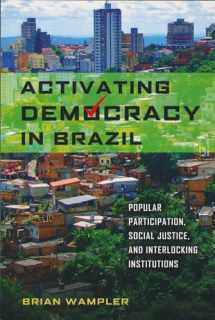
Activating Democracy in Brazil: Popular Participation, Social Justice, and Interlocking Institutions (Kellogg Institute Series on Democracy and Development)
Book details
Summary
Description
In 1988, Brazil’s Constitution marked the formal establishment of a new democratic regime. In the ensuing two and a half decades, Brazilian citizens, civil society organizations, and public officials have undertaken the slow, arduous task of building new institutions to ensure that Brazilian citizens have access to rights that improve their quality of life, expand their voice and vote, change the distribution of public goods, and deepen the quality of democracy. Civil society activists and ordinary citizens now participate in a multitude of state-sanctioned institutions, including public policy management councils, public policy conferences, participatory budgeting programs, and legislative hearings. Activating Democracy in Brazil examines how the proliferation of democratic institutions in Belo Horizonte, Brazil, has transformed the way in which citizens, CSOs, and political parties work together to change the existing state. According to Wampler, the 1988 Constitution marks the formal start of the participatory citizenship regime, but there has been tremendous variation in how citizens and public officials have carried it out. This book demonstrates that the variation results from the interplay of five factors: state formation, the development of civil society, government support for citizens’ use of their voice and vote, the degree of public resources available for spending on services and public goods, and the rules that regulate forms of participation, representation, and deliberation within participatory venues. By focusing on multiple democratic institutions over a twenty-year period, this book illustrates how the participatory citizenship regime generates political and social change.


We would LOVE it if you could help us and other readers by reviewing the book
Book review



